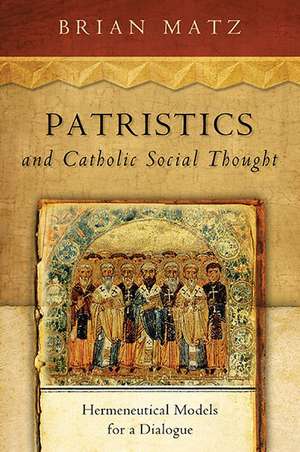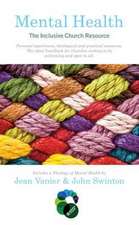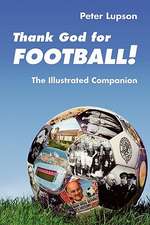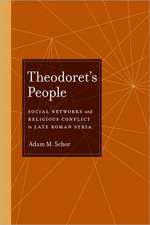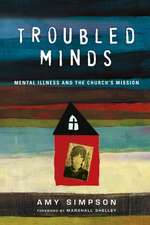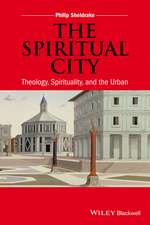Patristics and Catholic Social Thought – Hermeneutical Models for a Dialogue: Catholic Social Tradition
Autor Brian Matzen Limba Engleză Paperback – 29 iun 2014
Preț: 259.28 lei
Nou
Puncte Express: 389
Preț estimativ în valută:
49.62€ • 51.61$ • 40.96£
49.62€ • 51.61$ • 40.96£
Carte tipărită la comandă
Livrare economică 15-29 aprilie
Preluare comenzi: 021 569.72.76
Specificații
ISBN-13: 9780268035310
ISBN-10: 0268035318
Pagini: 312
Dimensiuni: 154 x 230 x 25 mm
Greutate: 0.48 kg
Ediția:1st Edition
Editura: MR – University of Notre Dame Press
Seria Catholic Social Tradition
ISBN-10: 0268035318
Pagini: 312
Dimensiuni: 154 x 230 x 25 mm
Greutate: 0.48 kg
Ediția:1st Edition
Editura: MR – University of Notre Dame Press
Seria Catholic Social Tradition
Recenzii
"Patristics and Catholic Social Thought is completely original in approach and stands alone as a unique contribution to the problem of bridging the hermeneutical gap between early Christianity and the contemporary church and the social issues with which we engage today. The book is written in a clear and simple style that is readily accessible to both the specialist and nonspecialist reader alike, making it useful for teachers of hermeneutics in religious studies departments and seminaries." —Wendy Mayer, Australian Catholic University
"Brian Matz has shown elsewhere his detailed grasp of patristic texts helpful for Christian ethics today. In this volume he skillfully articulates the major hermeneutical options for critically interpreting these texts and discerns among them the most promising for introducing a patristically inspired reading of biblical narratives to engage the moral imagination of contemporary believers. Christian social thought—both Protestant and Catholic—has much to gain from his analysis." —Daniel Finn, St. John's University
"Brian Matz’s innovative research in hermeneutical models provides occasion and opportunity for both veteran scholars and emerging experts to consider how we might carefully and authentically bring the voices of late antiquity into conversation with today's modern ethicists around shared concerns with poverty and injustice. Matz meticulously unfolds models that will surely impact and guide work in the academic field for generations. In this, he has provided the academic community with a gift and a challenge to make our work relevant, and thus to change not only how we think, but also how we live." —Brenda Llewellyn Ihssen, Pacific Lutheran University
“Matz deals with a topic that is quite technical in a clear and systematic manner, making this book relevant for anyone interested in sustaining the patristic treasures of the Christian faith and allowing them to bear fruit in our lifetime . . . . This work is an item worthy of a place in college, university, and seminary libraries, as well as the office shelves of those involved in the social justice ministries of Christian churches.” —Catholic Library World
“[Our] task as scholars is to gather complexity together and try to make sense of it, and Matz is to be commended for his considerable dedication to exploring topics of theological, social, and ethical importance. That he is able to make such a considerably complex task so manageable for the reader is a sign not only of his erudition among each of the fields but also points to his ability to enhance the future work of the academy.” —Journal of Religion
Notă biografică
Brian Matz is associate professor of the history of Christianity and the Archbishop Raymond G. Hunthausen Professor of Peace and Justice at Carroll College. He is author and co-editor of a number of books, including Reading Patristic Texts on Social Ethics: Issues and Challenges for Twenty-First-Century Christian Social Thought (co-edited with Johan Leemans and Johan Verstraeten).
Descriere
In Patristics and Catholic Social Thought: Hermeneutical Models for a Dialogue, Brian Matz argues that scholars and proponents of the modern Catholic social tradition can gain from the use of ancient texts for contemporary socioethical formation. Although it is impossible to expect a one-to-one correspondence between the social ideas of early church theologians, such as Augustine, and those of modern Catholic social thought, this book offers four hermeneutical models that will facilitate a fruitful dialogue between the two worlds. The result is a challenge to modern Christian ethicists to think more deeply about their work in light of the perspective of those who trod a similar path centuries ago.
Matz first examines an "authorial intent" hermeneutical model, as articulated in the philosophies of Friedrich Schleiermacher and Wilhelm Dilthey. The second is a "distanciation" model, relying on the thought of Hans-Georg Gadamer and Paul Ricoeur. The third is a "normativity of the future" model, so named by its proponents, Reimund Bieringer and Mary Elsbernd. The fourth is a "new intellectual history" model, which relies on contemporary literary-critical theories. In a series of case studies, Matz applies each model to two early Christian sermons on the parable of Lazarus and the Rich Man and, in so doing, illustrates that each one draws out different social ideas. Although each model ultimately bears fruit for Catholic social thought today, Matz concludes that the "normativity of the future" model is the one best suited to a productive use of early Christian texts in contemporary Catholic social thought.
"Patristics and Catholic Social Thought is completely original in approach and stands alone as a unique contribution to the problem of bridging the hermeneutical gap between early Christianity and the contemporary church and the social issues with which we engage today. The book is written in a clear and simple style that is readily accessible to both the specialist and nonspecialist reader alike, making it useful for teachers of hermeneutics in religious studies departments and seminaries." —Wendy Mayer, Australian Catholic University
Matz first examines an "authorial intent" hermeneutical model, as articulated in the philosophies of Friedrich Schleiermacher and Wilhelm Dilthey. The second is a "distanciation" model, relying on the thought of Hans-Georg Gadamer and Paul Ricoeur. The third is a "normativity of the future" model, so named by its proponents, Reimund Bieringer and Mary Elsbernd. The fourth is a "new intellectual history" model, which relies on contemporary literary-critical theories. In a series of case studies, Matz applies each model to two early Christian sermons on the parable of Lazarus and the Rich Man and, in so doing, illustrates that each one draws out different social ideas. Although each model ultimately bears fruit for Catholic social thought today, Matz concludes that the "normativity of the future" model is the one best suited to a productive use of early Christian texts in contemporary Catholic social thought.
"Patristics and Catholic Social Thought is completely original in approach and stands alone as a unique contribution to the problem of bridging the hermeneutical gap between early Christianity and the contemporary church and the social issues with which we engage today. The book is written in a clear and simple style that is readily accessible to both the specialist and nonspecialist reader alike, making it useful for teachers of hermeneutics in religious studies departments and seminaries." —Wendy Mayer, Australian Catholic University
